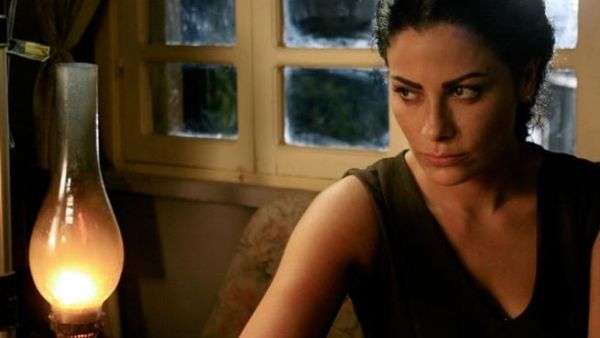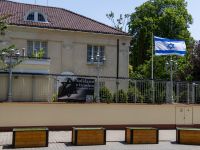Palestine has been less often in the news since the onset of the “Arab Spring.” The media’s need for a fresh angle belies the significance of the Palestinian story to the cultural production of this region. Like many places, the states hereabouts tend to defy confident black-and-white depictions.
For idealists and cynics alike, Palestine’s 20th-century history of settler-colonial dispossession and resistance has long provided opportunities to tell simple stories of right and wrong.
Politicians love simple stories of right and wrong, so there has long been a great deal of political utility embedded in the Palestine story, and it has been the centrepiece of as much propaganda as it has mediocre art.
Facets of Palestine have also provided a touchstone for an array of excellent artistic practice, among Palestinians at home and those living in the multi-generational exilic community.
Scanning at random the poems of Mahmoud Darwish, Samia Halaby’s explorations in abstract figuration, the archive-inflected contemporary practice of Emily Jacir or Khalil Rabah, the ironic video art musings of Larissa Sansour and the films of Elia Suleiman you will find as much breadth, nuance and profundity as you might expect in the cultural production in any small country that’s existed for less than a century.
In practice, black-and-white Palestine has proven particularly appealing to storytellers sitting at some remove from this grim business of occupation and collaboration. Yet Palestine has also inspired some passionate work by non-Palestinian artists.
Among the most accomplished work is lodged in the oeuvre of Lebanese novelist Elias Khoury. Khoury’s “Bab al-Shams” (“Gate of the Sun”) stands out as a pioneering hybrid of imagination and archival practice. Unfortunately the novel’s greatest strengths didn’t quiet survive Yousri Nasrallah’s well-meaning two-movie film adaptation.
This is all old news. Yet it’s useful to keep this business in mind as the parabolic arcs of the international film festival circuit swing through theaters near you with their flotsam.
It’s also worth keeping in mind when considering “Kingdom of Ants,” which has landed in Beirut cinemas on the verge of the festival season.
The latest work by Tunisia’s Chawki al-Mejri is a story of Palestinian resistance circa 2002. A heavily symbolic film, it takes the story of one Palestinian couple and depicts it as a sentimental metaphor for the Palestinian condition.
At the center of the story is Jordanian actor Saba Mubarak. Like her director, Mubarak seems to find most of her work in television, but “Ants” isn’t her first film. Her depiction of the feisty, sensual Layla in “Transit Cities,” the 2010 feature film premiere of Jordanian Mohammed Hushki, is responsible for most of the emotional weight of that film.
With “Ants” she faces the more challenging task of bringing life to the symbol of Palestine: beauty, innocence, devotion, maternity and resistance.
Mubarak’s character shares the burden of feminine representation with an older lady (Juliet Awad), resplendent in peasant dress, called “grandmother.”
In this world, the womenfolk reside in a pretty country house surrounded by olive groves, whose tranquility is violated only by the visits of Israeli army patrols (personified by a menacing Hebrew-slurring officer) and ever-present army helicopters. There they exchange speeches of longing and consolation and seldom smile.
The story has two principal male figures, occupying a similar generational divide. Paired off with the grandmother figure is an older gentleman (Jamil Awad). The love interest of Mubarak’s character (Monthir Rayahna) is an equally innocent (yet steadfast) young fellow obviously destined for the resistance.
The men are largely absent from the terrestrial lives of the women, except for brief visits, during which they and their womenfolk assume haunted poses and trade poetic soliloquies. A stallion is kept tethered to the pretty country house, apparently as a symbol of the menfolk’s continuing, if absent, virility.
In the early going, Mubarak’s character weds her still beardless and relatively cheerful young man. They do this in the anteroom of a vast subterranean vault that serves as the principle location of the action.
There they enjoy a chaste (post-marital) courtship, replete with the root systems of trees hanging playfully from the roof, goldfish ponds and arrays of inextinguishable candles.
These locations are easily the best thing about “Ants” – but whether the credit belongs to a locations scout or an artistic designer is unclear.
Chastity aside, Mubarak’s character becomes pregnant. This development earns her the unwanted attention of the thuggish Israelis, who have been hunting the father. Unable to learn his whereabouts, they toss her into a dungeon just in time for her to give birth.
Long before this development, the story may begin to seem familiar. Anyone who’s read (or watched) “Bab al-Shams” will recall that the title is taken from the name of the cave where Younes, an absent fighter, meets with Nahila, his long-suffering wife, for surreptitious, always fertile meetings.
The first of the two films in Nasrallah’s “Bab al-Shams” adaptation, the one that tells most of Younes and Nabiha’s story, reproduces (deliberately, it seems) the sentimental and formal conventions of television drama.
Mejri’s “Ants” would also like to combine the sentimentality of popular cinema with visual and spoken poetry. Alongside “Ants,” however, Nasrallah’s work looks like raw neo-realism.
You can sympathize with the filmmaker’s desire to ennoble Palestinian suffering with poetry. Unfortunately the poetry oscillates wildly from overblown speechifying to inadvertent comedy.
At one point, the best pal of the youngest family member is killed in an Israeli attack. Later on, as the young hero says goodbye to his friend, the corpse shrouded for burial, the dead boy’s face contorts into a grin.
Presumably the character’s pleased to be off to a better place. The audience may feel a twinge of envy.
“Kingdom of Ants” is screening in select Beirut cinemas.








